 MyDogBreeds
MyDogBreeds Both Grand Anglo-Francais Blanc et Orange and Basset Artesien Normand are originated from France. Grand Anglo-Francais Blanc et Orange may grow 34 cm / 14 inches higher than Basset Artesien Normand. Grand Anglo-Francais Blanc et Orange may weigh 16 kg / 36 pounds more than Basset Artesien Normand. Grand Anglo-Francais Blanc et Orange may live 3 years less than Basset Artesien Normand. Both Grand Anglo-Francais Blanc et Orange and Basset Artesien Normand has almost same litter size. Both Grand Anglo-Francais Blanc et Orange and Basset Artesien Normand requires Low maintenance.
Both Grand Anglo-Francais Blanc et Orange and Basset Artesien Normand are originated from France. Grand Anglo-Francais Blanc et Orange may grow 34 cm / 14 inches higher than Basset Artesien Normand. Grand Anglo-Francais Blanc et Orange may weigh 16 kg / 36 pounds more than Basset Artesien Normand. Grand Anglo-Francais Blanc et Orange may live 3 years less than Basset Artesien Normand. Both Grand Anglo-Francais Blanc et Orange and Basset Artesien Normand has almost same litter size. Both Grand Anglo-Francais Blanc et Orange and Basset Artesien Normand requires Low maintenance.
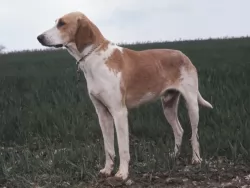 The Grand Anglo-Français Blanc et Orange is one of three Grand Anglo-Français breeds. The dogs comes from crossing French scenting hounds with English Foxhounds way back in the 19th century.
The Grand Anglo-Français Blanc et Orange is one of three Grand Anglo-Français breeds. The dogs comes from crossing French scenting hounds with English Foxhounds way back in the 19th century.
The sporting dog is rare, believing to be be pretty much confined to their country of origin – France. It is recognized in France by the French Kennel Club and also internationally by the Federation Cynologique Internationale. Since 2006, they have been recognized by the UKC and are thought to be kept essentially as a working dog as opposed to being kept as a companion dog.
 The Basset Artesien Normand hails from Normandy, France. He was bred around the middle ages and was a popular breed with the royalty of France when they met for hunting with hounds. How the Basset was developed isn’t known, but in the 1800s the dog’s popularity grew, and Napoleon himself was a fan. With some people wanting hunting skills in their dog, others good looks and some wanting a heavier dog, the Basset Artesien Normand or the BAN emerged.
The Basset Artesien Normand hails from Normandy, France. He was bred around the middle ages and was a popular breed with the royalty of France when they met for hunting with hounds. How the Basset was developed isn’t known, but in the 1800s the dog’s popularity grew, and Napoleon himself was a fan. With some people wanting hunting skills in their dog, others good looks and some wanting a heavier dog, the Basset Artesien Normand or the BAN emerged.
Some people believe that the Basset came from a mix of French hounds crossed with smallish breeds such as Beagles and Dashshunds.The truth is that the Basset’s origin is up for debate, but the Basset Artesian Normand took over in popularity from the Basset Normand and the Basset Chien d’Artois. These dogs are now extinct.
The first record of Bassets in America came from the 1700’s when a number of Bassets were presented to George Washington as gifts. It is uncertain what type of Bassets they were, but quite likely they were Basset Artesian Normands. The breed club was established in 1910 and given its present name in 1924. The dog is also recognized by the United Kennel Club in the Scenthound group.
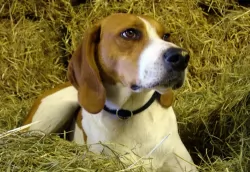 The lean, muscular Grand Anglo-Français Blanc et Orange is a large, powerful dog standing at 60 – 70cm at the withers and weighing 30 to 36 kg.
The lean, muscular Grand Anglo-Français Blanc et Orange is a large, powerful dog standing at 60 – 70cm at the withers and weighing 30 to 36 kg.
He has a short, broad head with a broad, flat skull. He has long legs, a long tail and long, floppy ears. His coat is white with orange markings. These dogs are instinctive hunters with a superb sense of smell and the ability to track their prey for miles.
Sociable, independent, loving and loyal, the Grand Anglo-Français Blanc et Orange can become attached to his owner. He doesn't want to be left alone for long periods of time, becoming bored and destructive.
Training and socialization is excellent for your dog, making him obedient and also more relaxed when you're not there.While he is patient and good with children, if you're looking for a playful pet, this dog wouldn't come as recommended for children, as his heart longs to just be outside on the hunt.
 The BAN is a small to medium sized dog, between 30 and 36 cm and weighing anything up to 20kg. He is low maintenance in terms of his short coat which is tri-colored – fawn, white with a black patch across the back. He has a long tail which is often held in an upright position. You can’t miss those long ears, which are a distinctive feature of this gentle, good-natured dog and which are low-set on the head. Add to that the dark, soulful eyes and you get a look that ‘wouldn’t hurt a fly.’
The BAN is a small to medium sized dog, between 30 and 36 cm and weighing anything up to 20kg. He is low maintenance in terms of his short coat which is tri-colored – fawn, white with a black patch across the back. He has a long tail which is often held in an upright position. You can’t miss those long ears, which are a distinctive feature of this gentle, good-natured dog and which are low-set on the head. Add to that the dark, soulful eyes and you get a look that ‘wouldn’t hurt a fly.’
The BAN is very similar to the regular Basset Hound but he is much slimmer. This is also because although he is a companion, he was at first a hunting canine, and is fit and muscular when fed the correct diet.
The Basset Artesien Normand is a friendly, affectionate dog, becoming a beloved pet of the family that he loves to be with. His gentle nature means that he won’t score high as a guard dog. He is gentle and affectionate with children in the home, and with some training and socialization he gets on well with other pets in the family. They’re fairly intelligent and you’ll be able to train him to carry out some important commands. As a hound, he tends to want to wander, and it is always a good idea to have him on a leash when out and about with him.
This breed of dog will need a good amount of exercise and other activities, even if it means climbing onto the couch and watching a movie with you. He can’t be left in the garden day after day on his own, and you’ll need to take him on daily walks and give him a game. Exercise is of particular importance for a dog like this, as he can easily put on weight and battle with back problems.
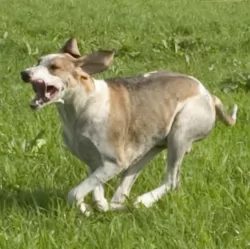 The Grand Anglo – Francais et Orange has always been a pack dog and used to being social. He will get on well with his entire human family as well as with any other pets in the home.
The Grand Anglo – Francais et Orange has always been a pack dog and used to being social. He will get on well with his entire human family as well as with any other pets in the home.
The Grand Anglo-Francais Blanc et Orange is a loyal dog, and when trained he becomes an excellent companion. He is patient with children, but doesn't make a particularly great playmate as he has a more serious personality.
The Grand Anglo-Francais Blanc et Orange is a dog that has been specifically developed to hunt, so ensure that he gets a good amount of exercise. While he is essentially a dog that loves working in a pack, he can still make his human family a loving and devoted pet.
 The Basset Artesien Normand is such a family friend with his docile personality. Short of stature, he has a keen sense of smell, much like the Bloodhound. With his short, smooth coat, he won’t require much from you in terms of grooming. His long ears, his sad eyes and his outward turned paws are all characteristics which endear him to dog lovers.
The Basset Artesien Normand is such a family friend with his docile personality. Short of stature, he has a keen sense of smell, much like the Bloodhound. With his short, smooth coat, he won’t require much from you in terms of grooming. His long ears, his sad eyes and his outward turned paws are all characteristics which endear him to dog lovers.
He doesn’t like to be left alone. This Basset is yours and he wants to be part of all the action in the house, and that includes meals. He has a hearty appetite, but you don’t want to be feeding him your scraps as he can put on weight quickly. This won’t be good for his health, and as a responsible pet owner, you need to be watching his weight.
Don’t forget his daily walk that he loves so much. Treat him with love and kindness and you’ll have yourself a happy, good-natured companion.
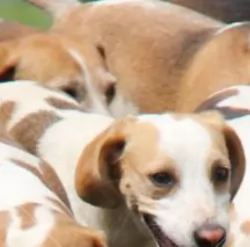 Capable of reaching 10 to 12 years in age, you won't really find any particular health issues with this dog. He is a fairly healthy dog and will be able to reach a good age with good nutrition, exercise, love and care.
Capable of reaching 10 to 12 years in age, you won't really find any particular health issues with this dog. He is a fairly healthy dog and will be able to reach a good age with good nutrition, exercise, love and care.
Because of the long, floppy ears, you want to be checking inside the ears. As a hunting scentdog, he will chase his prey through water if needs be, and damp ears can encourage bacteria.
Ear infections are common in most dogs, and you'll notice your pet scratching and rubbing at his ear and even shaking his head. You may also notice swelling or redness. Veterinary intervention will be necessary.
If your dog's ear infection has cleared up, you can maintain the health of the ear by cleaning them with a gentle cleanser and cotton wool. There is always caution when cleaning a dog’s ear, and rupturing the ear drum is one. Be careful, and if you're not sure, rather make an appointment with your vet to have his ears cleaned.
 The Basset Artesian Normand is a fairly healthy breed and you can expect him to reach 15 years, although you have to bear in mind that this breed is susceptible to some common health defects. As already mentioned, these long-bodied, short-legged dogs are prone to back problems. Weight gain is common in these dogs and additional weight will aggravate your dog’s back problems.
The Basset Artesian Normand is a fairly healthy breed and you can expect him to reach 15 years, although you have to bear in mind that this breed is susceptible to some common health defects. As already mentioned, these long-bodied, short-legged dogs are prone to back problems. Weight gain is common in these dogs and additional weight will aggravate your dog’s back problems.
While hip dysplasia is a genetic disease found more commonly in large dog breeds, it can also affect smaller breeds like the Basset. Your dog may develop a different way of walking and running and he may even resist movement as he can experience stiffness and pain in the rear legs. Hip dysplasia is mostly an inherited condition. Proper diet and exercise can help with preventing the disease.
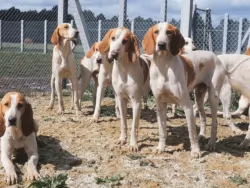 As a scenthound, your Grand Anglo-Français Blanc et Orange loves being outdoors and following a scent trail. These dogs therefore are better suited to life in the countryside as opposed to life in the city. Make sure you provide him with plenty of exercise – walks, swimming and running with you when you go cycling or jogging. Include ball- and rope games too.
As a scenthound, your Grand Anglo-Français Blanc et Orange loves being outdoors and following a scent trail. These dogs therefore are better suited to life in the countryside as opposed to life in the city. Make sure you provide him with plenty of exercise – walks, swimming and running with you when you go cycling or jogging. Include ball- and rope games too.
Your orange and white scent dog will thrive on you taking time out for him to brush his short coat twice a week and to also check for fleas and ticks at the same time.
Looking forward to his food, your energetic Grand Anglo-Français Blanc et Orange will require a high quality commercially manufactured food. Make sure that you buy the best brands to ensure your pet gets his vitamins and minerals in instead of just a lot of fillers, colorants and preservatives.
Many dog owners prefer giving their dogs several smaller meals throughout the day as opposed to one or two large meals. With his dry kibble you can add in some raw meat from time to time as well as cooked brown rice, cooked chicken and vegetables. See that he has access to a constant supply of fresh, cool water.
 The Basset Artesian Normand has a short, smooth coat and this will ensure that he is low maintenance. A regular brush twice a week will ensure you get rid of loose hairs.
The Basset Artesian Normand has a short, smooth coat and this will ensure that he is low maintenance. A regular brush twice a week will ensure you get rid of loose hairs.
Ear Infections - as is the case with long eared dogs, the Basset Artesian Normand is susceptible to ear infections. Check with your vet if you aren’t sure how to clean your dog’s ears so that you can prevent ear infections.
Brush your dog’s teeth about 2 or 3 times a week with special dog toothpaste- and brush. His nails will also need to be clipped regularly, more so if he doesn’t get to run on hard surfaces which wear the claws down.
You can speak to your veterinarian about wet- and dry dog foods and which type of food would suit your pet best. The type of food you give him, his age and his activity levels will be a guide on how to choose his food. Always make sure that a bowl of fresh, cool water is readily available to your 4-legged friend.